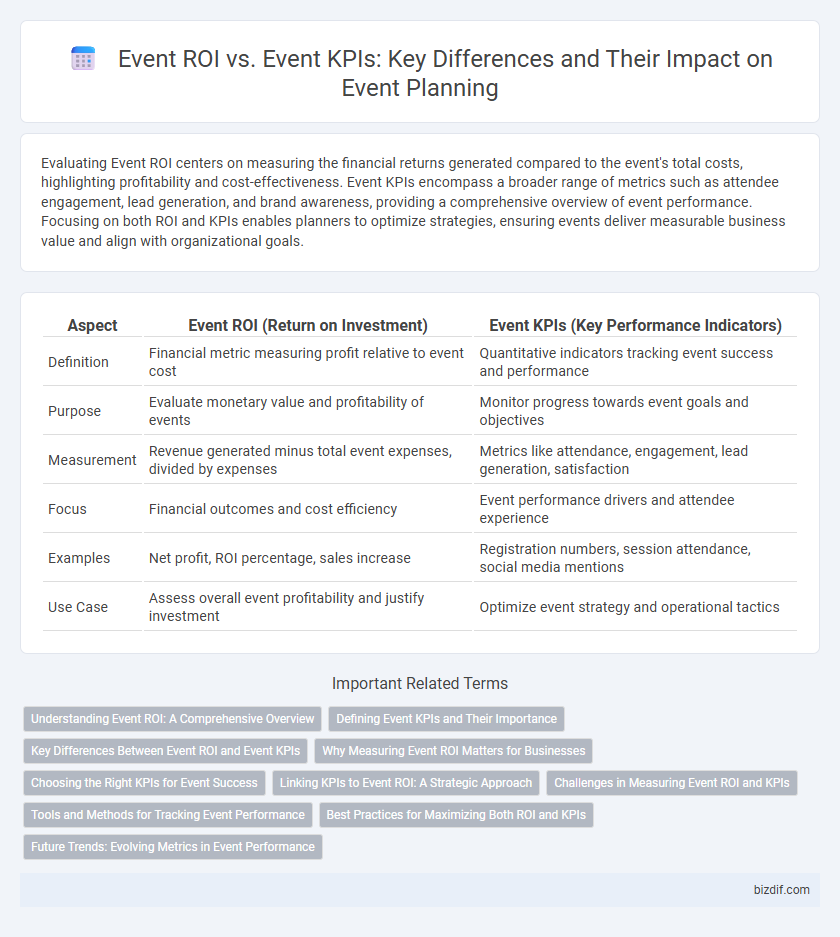Evaluating Event ROI centers on measuring the financial returns generated compared to the event's total costs, highlighting profitability and cost-effectiveness. Event KPIs encompass a broader range of metrics such as attendee engagement, lead generation, and brand awareness, providing a comprehensive overview of event performance. Focusing on both ROI and KPIs enables planners to optimize strategies, ensuring events deliver measurable business value and align with organizational goals.
Table of Comparison
| Aspect | Event ROI (Return on Investment) | Event KPIs (Key Performance Indicators) |
|---|---|---|
| Definition | Financial metric measuring profit relative to event cost | Quantitative indicators tracking event success and performance |
| Purpose | Evaluate monetary value and profitability of events | Monitor progress towards event goals and objectives |
| Measurement | Revenue generated minus total event expenses, divided by expenses | Metrics like attendance, engagement, lead generation, satisfaction |
| Focus | Financial outcomes and cost efficiency | Event performance drivers and attendee experience |
| Examples | Net profit, ROI percentage, sales increase | Registration numbers, session attendance, social media mentions |
| Use Case | Assess overall event profitability and justify investment | Optimize event strategy and operational tactics |
Understanding Event ROI: A Comprehensive Overview
Event ROI quantifies the financial return generated from an event relative to its total costs, serving as a critical measure for event success. Key performance indicators (KPIs) such as attendee engagement, lead generation, and social media reach directly influence ROI by tracking specific outcomes aligned with business objectives. Measuring event ROI enables planners to optimize resource allocation, improve future event strategies, and demonstrate tangible value to stakeholders.
Defining Event KPIs and Their Importance
Defining event KPIs involves identifying specific, measurable metrics such as attendee engagement, lead generation, and conversion rates that directly align with the event's strategic goals. These KPIs provide a clear framework for assessing the effectiveness of event activities and guiding real-time adjustments to maximize impact. Focusing on relevant KPIs ensures a more accurate evaluation of event ROI by linking performance data to business outcomes.
Key Differences Between Event ROI and Event KPIs
Event ROI measures the financial return generated from an event relative to its cost, focusing on metrics like revenue, profit margin, and cost savings. Event KPIs track specific performance indicators such as attendee engagement, lead generation, and brand awareness, providing insight into the event's effectiveness. Understanding the key differences between Event ROI and KPIs is crucial for optimizing both financial impact and strategic objectives in event planning.
Why Measuring Event ROI Matters for Businesses
Measuring event ROI is crucial for businesses to quantify the financial impact of their events and justify marketing expenditures. Event KPIs such as attendance, engagement, and lead generation provide insight, but ROI directly links event performance to revenue growth and cost efficiency. Accurate ROI measurement enables data-driven decisions to optimize future event strategies and maximize return on investment.
Choosing the Right KPIs for Event Success
Selecting the appropriate Key Performance Indicators (KPIs) is crucial for accurately measuring Event Return on Investment (ROI) and ensuring event success. Focus on KPIs such as attendee engagement, lead generation, and conversion rates to align event goals with measurable outcomes. Tracking these specific metrics enables event planners to optimize strategies and demonstrate the tangible impact of their events.
Linking KPIs to Event ROI: A Strategic Approach
Linking Key Performance Indicators (KPIs) directly to Event Return on Investment (ROI) enables event planners to measure success with precision and strategic clarity. By selecting relevant KPIs such as attendee engagement, lead generation, and conversion rates, organizers can quantitatively evaluate how each element impacts financial outcomes. This strategic approach maximizes resource allocation and drives continuous improvement in event planning efforts.
Challenges in Measuring Event ROI and KPIs
Challenges in measuring event ROI stem from difficulties in quantifying intangible benefits such as brand awareness and customer engagement. Discrepancies between event KPIs and actual ROI metrics often arise due to data fragmentation and inconsistent tracking methods. Accurate measurement requires integrating real-time analytics, attendee feedback, and lead conversion rates to bridge the gap between qualitative insights and financial returns.
Tools and Methods for Tracking Event Performance
Effective tools for tracking event ROI and KPIs include advanced analytics platforms such as Google Analytics, event management software like Eventbrite, and CRM integration tools that capture attendee engagement and conversion rates. Methods involve setting clear performance metrics, using real-time data dashboards for monitoring, and employing post-event surveys combined with financial analysis to measure revenue impact and overall event success. Leveraging these technologies and approaches ensures accurate evaluation of event performance and strategic decision-making for future planning.
Best Practices for Maximizing Both ROI and KPIs
Maximizing Event ROI and KPIs requires aligning event objectives with measurable outcomes such as lead generation, attendee engagement, and customer retention rates. Utilizing data analytics tools to track these KPIs in real time enables fine-tuning event strategies for higher financial returns and improved participant satisfaction. Consistent post-event evaluation and integration of feedback loops ensure continuous improvement and stronger alignment between investment and performance metrics.
Future Trends: Evolving Metrics in Event Performance
Future trends in event planning emphasize shifting from traditional ROI to comprehensive Event KPIs that assess engagement, attendee experience, and digital interaction metrics. Advanced data analytics and AI integration enable real-time performance tracking, enhancing decision-making and personalized event strategies. These evolving metrics prioritize long-term brand impact and customer loyalty over immediate financial returns.
Event ROI vs Event KPIs Infographic

 bizdif.com
bizdif.com